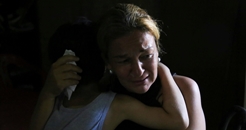 Childhood trauma could affect the next generation
Childhood trauma could affect the next generation
From an article by Quartz
It is a well-documented and deeply sad fact that if you suffer from trauma as a child, you are more likely to suffer as an adult. People with a childhood history of trauma have a greater risk of being obese, getting cancer, suffering from heart disease and mental illness, and dying sooner. They’re also more likely to engage in risky behaviors—smoking, illicit drugs, and high-risk sex—which is also predictive of bad outcomes. [See a previous blog on this - Adverse Childhood Experiences (ACEs).]
Now researchers have gone a step further, examining whether a parent’s trauma might materialize in their children’s health. A new study, published in Pediatrics, found that for every type of “adverse childhood event” (ACE) a parent went through, their children had 19% higher odds of poorer health and 17% higher odds of having asthma. ACEs are serious traumas or stressors that happen in a child’s early years, including physical abuse, sexual abuse, emotional abuse, physical neglect, and domestic violence, among others. An expanded definition also includes witnessing violence, facing racial or ethnic discrimination, and living in an unsafe neighborhood.
Félice Lê-Scherban, the study’s lead researcher and an assistant professor in Drexel’s Dornsife School of Public Health, said that we are probably underestimating the effects of trauma by looking at only how it impacts the person who experiences it directly. “Looking intergenerationally gives us a more comprehensive picture of the long-term processes that might affect children’s health,” she said.
The study used surveys taken by 350 Philadelphia parents who answered questions about their own “ACEs” as well as questions about their children’s health, health behaviors—like eating fruits and vegetables and getting exercise—and health-care access. The respondents were overwhelmingly female (80%), and 45% were African-American. The results held when the authors controlled for income and education.
The data revealed a shocking history of abuse and neglect: Overall, 85% of parents in the survey had experienced at least one ACE (with the expanded definition), and 18% had experienced more than six. The parent-child pairs were all from Philadelphia, where one-quarter of residents live in poverty.
Specifically, of the parents surveyed:
-
Nearly 42% said they’d witnessed violence, such as seeing someone shot, stabbed or beaten, as a child
-
38% said they lived with a problem drinker or someone who used drugs during their youth
-
About 37% said that they had been physically abused as children
Lê-Scherban says the study—which does not show causation, only association—shows how strong the link between trauma and long-term negative health outcomes might be. The more ACEs a parent had suffered as a child, the more likely their own children were to have poorer health status. Particularly worrying, she said in an interview, was the fact that having asthma and poor health as a child are a strong predictors of having them into adulthood, which in turn predict higher mortality rates.
The authors do not know the mechanism by which trauma is passed on—that is, if it is primarily environmental, genetic, or epigenetic (involving genetic changes that are caused by environmental factors, such as smoking, diet, or stress).
The study did not measure factors which could buffer ACEs: strong families and tight-knit communities, both of which can build resilience against trauma. The sample was small and skewed female. But the association warrants further research: The better we understand the effects of trauma, the better chance we have of intervening in order to help mitigate the damage.
Read the full article here.
There is a movement in the USA and other countries for parents and authorities to become trauma informed. This is covered by various blogs on this site - search tag 'Adverse Childhood Experiences'.
Retweet about this article:
From an article by Quartz, 06/02/2019